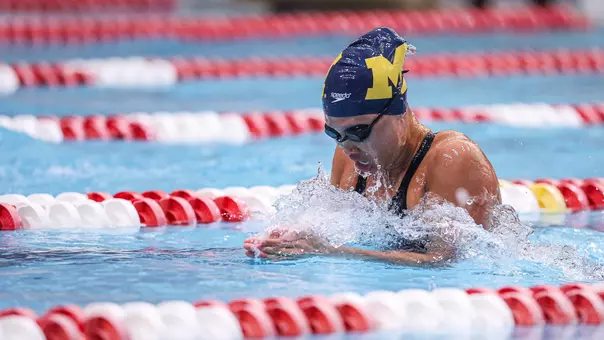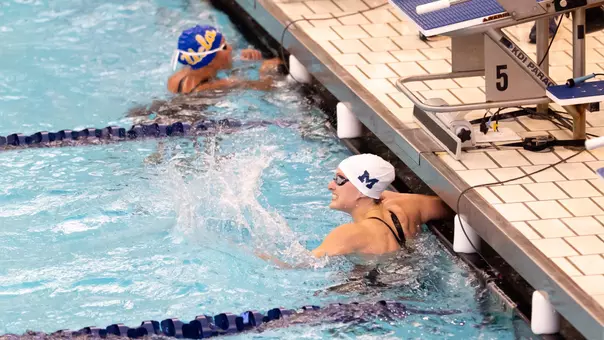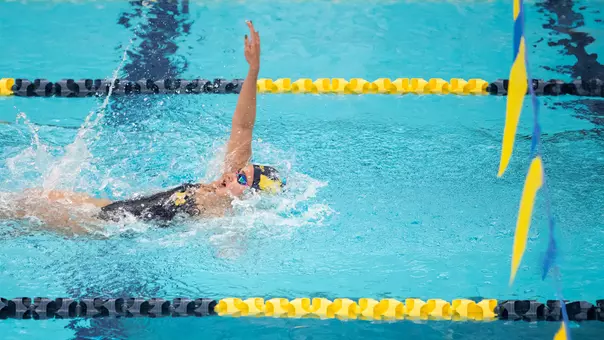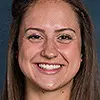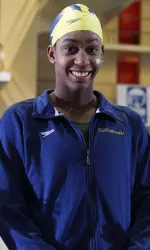
Future Friday: Q&A with Natasha Moodie
4/15/2016 12:00:00 AM | Women's Swimming & Diving
April 15, 2016

Natasha Moodie
After representing the block M with pride while they competed for the Maize and Blue, our student-athlete alumni have gone off to become professionals in different areas of their lives. Whether they continued on in their sport, helped to build up a company or started a family, they are building a future. They are building our future. As they leave the University of Michigan campus they go forth with all they learned here to create a better future for us all.
To this day, Natasha Moodie remains one of the best sprinters in program history. Originally from Jamaica, Moodie lettered from 2008-11, serving as captain and winning a Big Ten title with the 200-yard freestyle relay team during her senior year. In the pool, she was a three-time NCAA All-America honorable mention -- all on relays -- and was a two-time All-Big Ten selection. In the summer after her first year in Ann Arbor, Moodie represented Jamaica at the 2008 Summer Olympics in Beijing.
She graduated in December 2011 with a degree in movement science, and transitioned full-time to the classroom. Through AmeriCorps, Moodie taught part-time at a low-income school in Tampa, Florida. She is now a third-year high school science teacher at Palmview High School in Palmview, Texas. Located a few miles from the U.S-Mexico border, Palmview is a small, low-income community with a large percentage of first-generation immigrant families and non-documented workers.
Moodie applied and got accepted to Johns Hopkins with the hopes of getting her master's in education, but made the decision to hold off on her studies in order to focus her full attention on her current students.
Q. First off, do you still swim?
A. I don't. There are very few pools where I live. I have to drive a town over to get to a pool. With my work schedule, it's very difficult -- impossible, even -- to get in for lap swim. I might do it once in a while, but to be honest, teaching consumes a lot of my time. I might do it more if I had more energy at the end of the day.
Q. Have you been following the team's progress?
A. This team, I wasn't teammates with any of them, but I've spoken to a lot of the alumni and all they talk about was this team's quest to win a Big Ten championship and how possible it was. I followed them through the 2016 championship season, and as an alum, I was very excited.
Q. With all the records that were broken in the last couple of years, your 50-yard freestyle record stood for a long time until Ali DeLoof re-set it this year. What did you think when you heard the news?
A. I was just excited to see a woman at Michigan excel in the sprint events. That's very near and dear to me. Honestly, I had been expecting her to break it for a while. I watched the race. It was such an exceptional swim. My jaw was open. Michigan has a great history of sprinters, especially on the men's side, but it's been a while since a woman was that fast. That was great to see.
Q. Being a former team captain, what's the best piece of advice you can give aspiring leaders?
A. This is something that my former head coach, Jim Richardson, spoke to me about once. It's about servant leadership. He said, "Instead of leading the pack, imagine yourself being on the low end of the totem pole. You put people above yourself." I always enjoyed doing that with my team. I think that was a view that a lot of my teammates had, as well. I could still call any of them and visit. It wouldn't be this mindset of, "Why is she talking to me five years later?" Life is passed by, but I can talk to these women later in life and see what they're doing, and remember the times that founded our success. I can talk to them and still feel that bond that I had when I was on the team.
Q. You started a pen-pal program between your students and members of the team. How did this idea come about?
A. I teach a mixture of grades, but primarily seniors. With my schedule, it's not feasible for me to read all the college essays they're writing. I reached out to a couple local universities, but didn't have much luck, so I decided to ask Michigan. I know the time demands. Assumed it would be a long shot, but I needed assistance. The girls jumped on it immediately, and the men's team helped, too, along with some other organizations. More than 230 people signed up to help just through word of mouth. It wasn't flawless, but I'm very thankful to everyone who helped out.
Q. What did you envision the goal to be?
A. The local community, at least a large part of my student population, is made up of first generation college students and first-time high school graduates. A lot of their parents can't help them. I pushed them to apply for colleges and scholarship, made it mandatory. It was good for my students for a few reasons. They could work on their communication skills and it also boosted their confidence knowing that random people from another state so far away were willing to take the time out of their day to look at these. My students were blown away. Some of them will now be able to go to college and come out with a trajectory that they might not have otherwise had. It's an effect that'll last for a very long time.
Q. What kind of feedback did you get from the team?
A. I know that it's been very positive. Some of my students asked questions. We tried pairing students with college students that had similar majors or interests. We plan to send thank yous and solicit more feedback.
Q. You had some injury problems during your senior year. What did you learn about yourself through that experience?
A. One, faith is very important. It's something I hold on to very closely now. I don't know how to operate without it. Second, I realized how important the staff is behind you, the people that support you. And my teammates, too. They all could have given up on me, but I never got any negative reaction. That's the value of having good people. I don't give myself any credit for getting through that. It takes perseverance. Rehab. I was in the training room for many hours throughout my four years, but especially that last one. Without those two factors, I don't know that I would have been able to do it.
Q. In your letter to the team, you wrote, "The University of Michigan provided me with the best four years of my life because those were the four years where I was given the opportunity to prove to myself, and to everyone around me that there are no limits to what I can achieve." Looking back, what about your experience at Michigan helped you get to where you are?
A. My last two years of high school weren't the best, and my skills going to Michigan, at least academically, weren't as strong as they could have been. My first year, I met with a professor of mine because I was having trouble studying for a test. She said, "The test is created so the average grade is a failing grade." I asked, "How am I supposed to pass?" And she said, "That's the Michigan Difference." That's how I hold onto that. They never lowered expectations for me. They never said, "It's OK. You're struggling. You can stop." They never allowed that for me. They kept pushing me. Michigan Wolverines are victors. When I didn't necessarily believe it, they did. Your mindset is here, the bar is here, and you have to find a way to meet it. Whatever it is, you have to get there. My career and my students throw me curveballs every single day. I was taught better than to give up. The people at Michigan taught me that you don't give up. Nothing should be able to stop you in the pursuit of excellence.
The 2015-16 academic year marks the 150th anniversary of Michigan Athletics. We invite the University of Michigan family to celebrate the passion that fuels us, rediscover the stories and traditions that unite us, and imagine what the future holds for us. We look forward to celebrating "This Michigan of Ours." To share a memory of Michigan Athletics, please fill out our online form or email goblue150@umich.edu.

